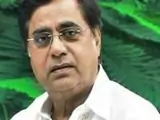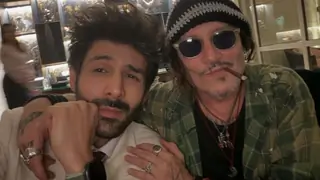From Wikipedia, the free encyclopedia
For Jagjit Singh the science writer, see Jagjit Singh (writer).
Jagjit Singh (February 8, 1941 - ) is a popular singer of ghazals in Hindi/Urdu and Punjabi, a composer and also a playback singer in Bollywood. Jag and Jit (both Hindi/Punjabi words) mean "World" and "Victory" respectively, thus the meaning of the name is One who has conquered the world.
| Contents 1 Family and education 2 Career 2.1 Early years - 2.2 Rise of Jagjit Singh
3 Awards 4 Discography 4.1 Sung for films 4.2 Music composed for films - 4.3 Ghazal albums
- 5 External links
|
Family and education
Jagjit Singh was born in Ganganagar (also called "SriGanganager"), Rajasthan. His father Sardar Amar Singh Dhiman, employed with the Government of India, hailed from Dalla village in Ropar district of Punjab and his mother Sardarni Bachchan Kaur came from a deeply religious Sikh family of Ottallan village near Samralla. His siblings include four sisters and two brothers and he is fondly called Jeet by his family members. Although his late father wanted him to become a bureaucrat by joining the Indian Administrative Service, he was later reported to be happy with his son's achievements in the world of music. Jagjit went to Khalsa High School at Ganganagar. He studied Sciences during higher secondary (after matriculation) from Government College, Ganganagar and went on to graduate in the Arts stream from DAV College, Jalandhar. He also acquired a Post Graduate Degree in History from Kurukshetra University, Haryana.
Career
Early years
His association with music goes back to his childhood. He learnt music under Pandit Chaganlal Sharma for two years in Ganganagar, and later devoted six years to learning Khayal, Thumri and Dhrupad forms of Indian Classical Music from Ustad Jamaal Khan of Sainia Gharana. He was willing to learn from lesser known but talented musicians throughout his college days. The Vice Chancellor of Punjab and Kurukshetra University, Late Professor Surajbhan encouraged his interest in music. He arrived in Mumbai (then Bombay) in 1965 in search of better opportunities as a career musician and singer. His early struggle in the music industry, though not too harsh by his own account, still had its share of trials and tribulations. He lived as a paying guest and his earlier assignments were singing advertisement jingles or performing at weddings and parties.
Rise of Jagjit Singh
During 1970s, in India, the art of ghazal singing was dominated by well-established names like Noor Jehan, Malika Pukhraj, Begum Akhtar, Kundan Lal Saigal, Talat Mahmood and Mehdi Hassan. However, Jagjit was still able to make his mark and carve out a niche for himself. In 1976, his album The Unforgettables (On HMV LP Records) hit the music stores. Essentially a ghazal album, it's emphasis on melody and Jagjit's fresh voice was a departure from the prevalent style of ghazal rendition, which was heavily based on classical and semi-classical Indian music. Skeptics had their own reservations, purists scorned at it but it was widely successful among listeners and the album set new sales records.
In 1967 he met Chitra, also a singer, while doing jingles. After a two year long courtship they got married in 1969. They epitomise the first successful husband-wife singing team. Jagjit Singh, with Chitra, has contributed immensely towards changing the course of this genre of music known as 'Ghazal' making it more ear friendly, melodic and enojoyable by a wider audience.
Later successful releases of the duo include Ecstasies, A Sound Affair and Passions.
While the above-mentioned albums were breezy, Beyond Time released in the opening years of nineties was an experimentation with sounds and conveyed a feeling that was beyond space and time. Around this time the duo was struck by grief as their only son, Vivek, who was twenty-one, met an untimely death in a road accident. Not only Jagjit and Chitra, it was a big shock to his numerous fans also. The album is a tour to the soul, ethereal, conscientious and introspective. The ghazals have a moving quality to them since they express the personal loss of Jagjit and Chitra. 'Someone Somewhere' was the last album containing ghazals sung by both. After that, Chitra quit singing.
Jagjit Singh continued singing his later albums, including Hope, In Search, Insight, Mirage, Visions, Kahkashan (meaning "Galaxy"), Love Is Blind, Chirag (meaning "Lamp"/"Flame") also achieved success. Sajda (an Urdu word meaning "offering"), which has ghazals sung by Jagjit and Lata Mangeshkar was another brilliant release and made its mark as a classic Ghazal album. The combined successes of his many albums made him arguably the number one ghazal singer in India. The audience wanted more and Jagjit Singh obliged with his Punjabi albums. Ebullient, effervescent and bubbly, his Punjabi songs are pleasant as well as joyous. Their enchanting ghazals use the choicest poetry by renowned poets including Mirza Ghalib, Ameer Meenai, Kafeel Aazer, Sudarshan Faakir and Nida Fazli…. and contemporary writers like Nazir Bakri, Faiz Ratlami and Rajesh Reddy.
Jagjit also sang (as playback singer) for various songs in Bollywood films including Arth, Saath Saath and Premgeet (all from 1980s). The scores remain popular even today. In fact, all the songs of film Premgeet were composed by Jagjit. His compositions for the TV serial Mirza Ghalib (based on the life of the poet Mirza Ghalib), remain extremely popular among ghazal aficionados. The elusive element of Ghalib's poetry was sensitively and wonderfully brought out in the soulful compositions of Ghalib's ghazals by Jagjit Singh. The album could veritably be called a magnum opus.
Compared to his earlier ghazals (sung during 70s and 80s) his later ghazals have acquired a more soulful and poignant demeanour, as in albums such as Marasim, Face To Face, Aaeena, Cry For Cry. But all through this, romance never took a backseat! The journey to the soul is punctuated by romantic pauses like Dil Kahin Hosh Kahin. A testimony to his popularity is his ghazals in recent Bollywood flicks like Dushman, Sarfarosh and Tarkeeb.
Most of the earlier albums of Jagjit Singh had English titles. Later, these had Urdu names like Sahar (meaning "Dawn"/"Morning"), Muntazir (meaning "In waiting"), Marasim (meaning "Relation"/"Relationship"/"Affinity" ) "Soz" (Pathos) etc.. The switchover may not be deliberate but marks a milestone in his singing. These new albums show a far better selection of lyrics and yes, even the singing has scaled new peaks.
Besides ghazals, Jagjit Singh has also sung Bhajans and Gurbani(Hindu and Sikh devotional hymns respectively) . Albums such as Maa, Hare Krishna, Hey Ram...Hey Ram, Ichhabal and also Man Jeetai Jagjeet in Punjabi, put him in the league of Bhajan singers such as Mukesh, Hari Om Sharan, Yesudas, Anup Jalota and Purushottam Das Jalota. The soothing effect that Jagjit's voice has on frayed nerves has prompted psychiatrists in metros (as large cities in India are called) to prescribe them as stress relievers.
In addition to cultivating his own successful career, Jagjit Singh has been involved in guiding many new, talented singers such as Talat Aziz, Ghanshyam Vaswani, Ashok Khosla, Siza Roy and Vinod Sehgal. He also lends active support to several philanthropic endeavors such as the Library at St. Mary's (Mumbai), Bombay Hospital, CRY, and ALMA (an organization that adopts under-privileged students for further education and development).
Jagjit Singh lives in Cumballa Hills, Mumbai.
Awards
In 2003, he was awarded the Padma Bhushan.
Criticism
Jagjit Singh is alleged by Pandit Bholanath to have made ghazal a very much commonplace and commercial stuff. Unlike Mehdi Hassan, Ghulam Ali and Talat Mehmood, his singing lacks the purity of ghazal rendition as deviates from classicism and imparts on light singing, mostly influenced by mass culture.
Discography
Sung for films
Umar (2006) (playback Singer: "Khumari Chaddh Ke Utar Gayi") Kasak (2005) Veer-Zaara (2004) Dhoop (2003) (playback singer: "Benaam Sa Ye Dard", "Har Ek Ghar Mein Diya", "Teri Aankhon Se Hi") Joggers' Park (2003) ("Bari Najuk Hai") Aapko Pehle Bhi Kahin Dekha Hai (2003) ("Aisi Aankhen Nahin Dekhi") Leela (2002) ("Dhuan Uttha Hai", "Jaag Ke Kati", "Jabse Kareeb Ho Ke Chale", "Tere Khayal Ki") Vadh (2002) ("Bahut Khoobsurat") Deham (2001) ("Yun To Guzar Raha Hai") Tum Bin (2001) (Koi Fariyaad) Tarkieb (2000) (Kiska Chehra ab mai dekhun... Tera chehra dekhkar) Shaheed Udham Singh (2000) () Bhopal Express (1999) Sarfarosh (1999) ("Hosh Walon Ko") Dushman (1998) ("Chhitti Na Koi Sandesh") Khudai (1994) ("Din Aa Gaye Shabab Ke", "Ulfat Ka Jab Kisis Ne Liya Naam", "Ye Sheeshe Ye Rishte") Mammo (1994) (hazaar baar ruke ham, hazaar baar chale by Gulzar) Khal Nayak (1993) ("O Maa Tujhe Salaam") Nargis (1992) ("Dono Ke Dil Hai Majboor Pyar Se", Main Kasie Kahoon Janeman) Billoo Badshah (1989) Aakhri Kahani (1989) Doosra Kanoon (1989) (TV) Kaanoon Ki Awaaz (1989) Mirza Ghalib (1988) (TV) Hit Serial Directed by Gulzar Rahi (1987) Aashiana (1986) ("Humsafar Ban Ke Hum") Long Da Lishkara (1986) ("Ishq Hai Loko", "Main Kandyali Thor Ve" and "Sare Pindch Puare Paye") Phir Aayee Barsat (1985) ("Na Mohabbat Na Dosti Ke Liye") Ravan (1984) ("Hum to Yun Apni Zindagi Se Mile", "Main Gar Mein Chunariya") Bahuroopi (1984) Bhavna (1984) ("Mere Dil Mein Tu Hi Tu Hai") Kalka (1983) Tum Laut Aao (1983) Zulf Ke Saye Saye (1983) ("Nashili Raat Mein") Arth (1982) ("Jhuki Jhuki Si Nazar", "Koi Yeh Kaise Bataye", "Tere Khushboo Mein Base Khat", "Too Nahin To Zindagi Mein Aur Kya Reha Jayega" and "Tum Itna Jo Muskura Rahe Ho") Saath Saath (1982) ("Pyar Mujh Se Jo Kya Tumne", "Tum Ko Dekha To Yeh Khayal Aaya", "Yeh Bata De Mujhe Zindagi", "Yeh Bata De Mujhe Zindagi", "Yeh Tera Ghar Yeh Mera Ghar", "Yun Zindagi Ki Raah Mein") Sitam (1982) Prem Geet (1981) (Hontho se chhoo lo tum mera geet amar kar do: FIRST HIT FILMY SONG) Ek Baar Kaho (1980) Griha Pravesh (1979) Avishkaar (1973) Aankhon Aankhon Mein (1972) (associate camera operator) - Heena (TV serial) (1999)
Music composed for films
1. Leela (2002) 2. Khudai (1994) 3. Billoo Badshah (1989) 4. Kaanoon Ki Awaaz (1989) 5. Mirza Ghalib (1988) (TV Seriel directed by Gulzar) HiT Album 6. Rahi (1987) 7. Long Da Lishkara (1986) 8. Ravan (1984) 9. Arth (1982) 10. Sitam (1982) (as Jagjit-Chitra) - 11. Prem Geet (1981)
Ghazal albums
Unforgettables 1976 A Milestone 1980 Main aur Meri Tanhaayee 1981 The Latest 1982 Ecstasies 1984 A Sound Affair 1985 Echoes 1985-86 Beyond Time 1987 Mirza Ghalib (Two Volumes) 1988 TV Serial Directed by Gulzar Passion / Black Magic 1988 Ghazals from Films 1989 Emotions Man Jite Jagjit 1990 Memorable Ghazals of Jagjit and Chitra 1990 Someone Somewhere 1990 H O P E 1991 Sajda (Two Volumes with Lata Ji) 1991 Kahkashan (Two Volumes) 1991-92 TV Serial Directed by Jalal Agaa Visions (Two Volumes) 1992 In Search 1992 Rare Gems 1992 Face to face 1993 Your Choice 1993 Chiraag 1993 Desires 1994 Insight 1994 Cry for Cry 1995 Mirage 1995 Unique 1996 Come Alive in a Concert 1998 (CD) Live at the Wembley Love is Blind 1998 Silsilay 1998 (Lyrics by Javed Akhtar) Marasim 1999 (Lyrics by Gulzar) Saher 2000 Samvedna 2002 (Atal Ji's poetry) Soz 2002 (Lyrics by Javed Akhtar) Forget Me Not 2002 Jaam Utha Muntazir (2004) Tum To Nahin Ho (Lyrics by Bashir Badr) - Best of Jagjit & Chitra Singh (includes Mere Darwaaze Se Ab Chand Ko Ruksat Kar do by Ali Sardar Kaffrey)


























